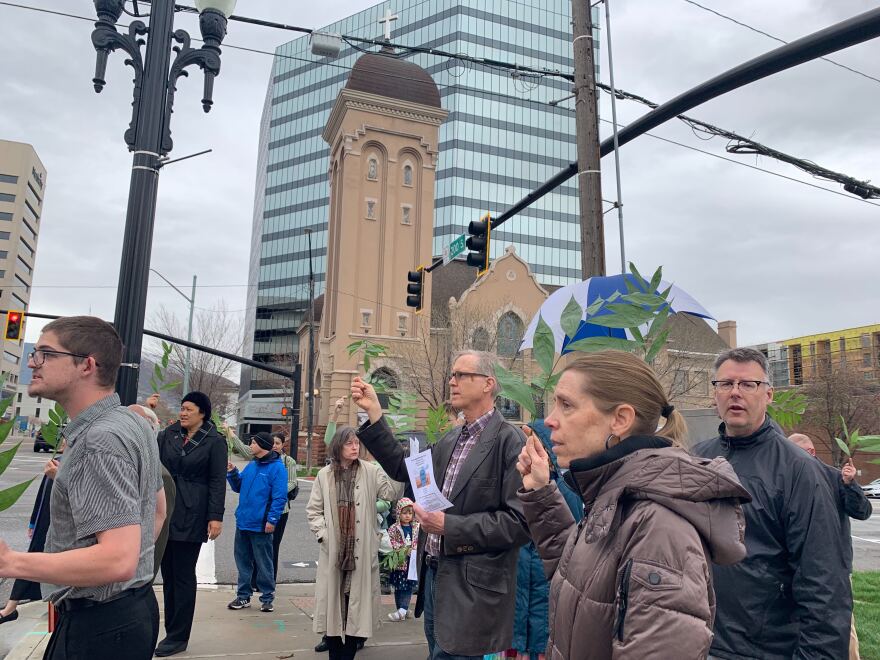On a recent morning before Sunday services, some of Salt Lake City’s poorest residents arrive at First United Methodist Church, where Jim Ecker helps serve them an early breakfast.
A volunteer offering French toast, orange juice and coffee in the church’s basement dining area, Ecker serves the homeless and others twice a month here at his congregation.
A lifelong Methodist, Ecker has belonged to congregations in Georgia, North Carolina and now this church, one of the city’s oldest. He says he’s stuck with this faith because it is welcoming. He embraces Methodism because it encourages him to practice what is preached.
“My view of Methodism isn’t that I want to just sit in the pew and be preached to,” he said. “I need to put it into practice and it is important to me to reach out to somebody and share what I think religion is.”

But Ecker, who is gay, is worried that the United Methodist Church outside of Utah may be turning away from members like him. Global leaders of the United Methodist Church voted in February for what they call a “traditional plan” to ban homosexual clergy and same-sex marriage. The church’s Judicial Council is meeting this week to make a final ruling, which local church leaders hope rejects the earlier vote.
“I am married. I have a husband. I feel accepted at my church,” Ecker said.
The Rev. Elizabeth McVicker, who leads First United Methodist church, says the Methodist church has a “big tent philosophy” where inclusiveness is a priority.
“We have 17 United Methodist Churches in Utah and the overwhelming majority of them are in favor of inclusivity — of gay and lesbian people, doing same-sex marriages, ordaining gay and lesbian people,” McVicker, whose family immigrated from Myanmar, explained.

This week is a pivotal moment for the church. If leaders uphold the ban on LGBTQ pastors and same-sex marriage, it could split along socially progressive and conservative lines. Local members of First United Methodist church are wrestling with the possibility of a split after February’s vote, including Gheeta Smith.
Born in India, Smith was adopted by two United Methodist school teachers in Salt Lake.
“The thing that kept me grounded as I was growing up was — I was within walking distance of Hilltop United Methodist Church down in Sandy,” she said. “And that was where I worshiped and learned about how you get along with each other.”
Utah wasn’t as diverse as it is now and she often felt like she didn’t fit in, she says. But she found acceptance at church.
“I wanted to be white and blond haired and blue-eyed,” said Smith, who chairs the National Board of Directors for Reconciling Ministries Network, an organization that advocates for the LGBTQ community within the church. “Not brown with black hair.”
She says for many in the church it was devastating when the Methodist leaders at the faith’s general conference voted to support the “traditional plan.”

“Many people are experiencing what happened as if it were a death in the family,” she said. “So, there is a lot of grief that people are processing as well.”
This wouldn’t be the first time the Methodist Church has fractured. Southern Methodists broke off from northern churches over slavery in 1844 then reunited in 1939.
Inspired by the teachings of John Wesley, the church began in England 250 years ago. It came to America in the 1700s.Today, the church has 7 million members in the United States and 12 million globally. And therein lies the issue, says Ken Carter, president of the Council of Bishops of the United Methodist Church.
“The majority of U.S. persons who participated in these general conferences have voted for inclusion. But we are not a national church — we’re a global church,” said Carter. “And so, 30%- plus of our voting membership is beyond the United States. Were this a United States matter, the United Methodist Church would have been very consistent with, likely with, Lutherans, Presbyterians, Episcopalians.”

Most mainline Protestant denominations have already taken a stand on LGBTQ issues. There also have been church trials within the United Methodist church over gay clergy, said Marie Griffith, a historian and the Director of the John C. Danforth Center on Religion and Politics at Washington University in St. Louis.
“There have been a number of famous instances where very dedicated clergy who turned out to be gay and opening practicing were essentially defrocked — their ministerial credentials were taken away,” she said. “There have been years of debate and discussion and of political angling over these issues for some time and now it is coming to a head.”
As for Jim Ecker, he’s contemplating leaving the church he was born and baptised into if the LGBTQ ban is upheld.
“Because at some point you want to be accepted fully, but you also want to be really true to yourself,” said Ecker.
However, he may not have to leave, McVicker says .
“We will take the more inclusive route, whether it is within the existing denomination or whether we break off,” she said.
But she says she hopes it doesn’t come to that.



